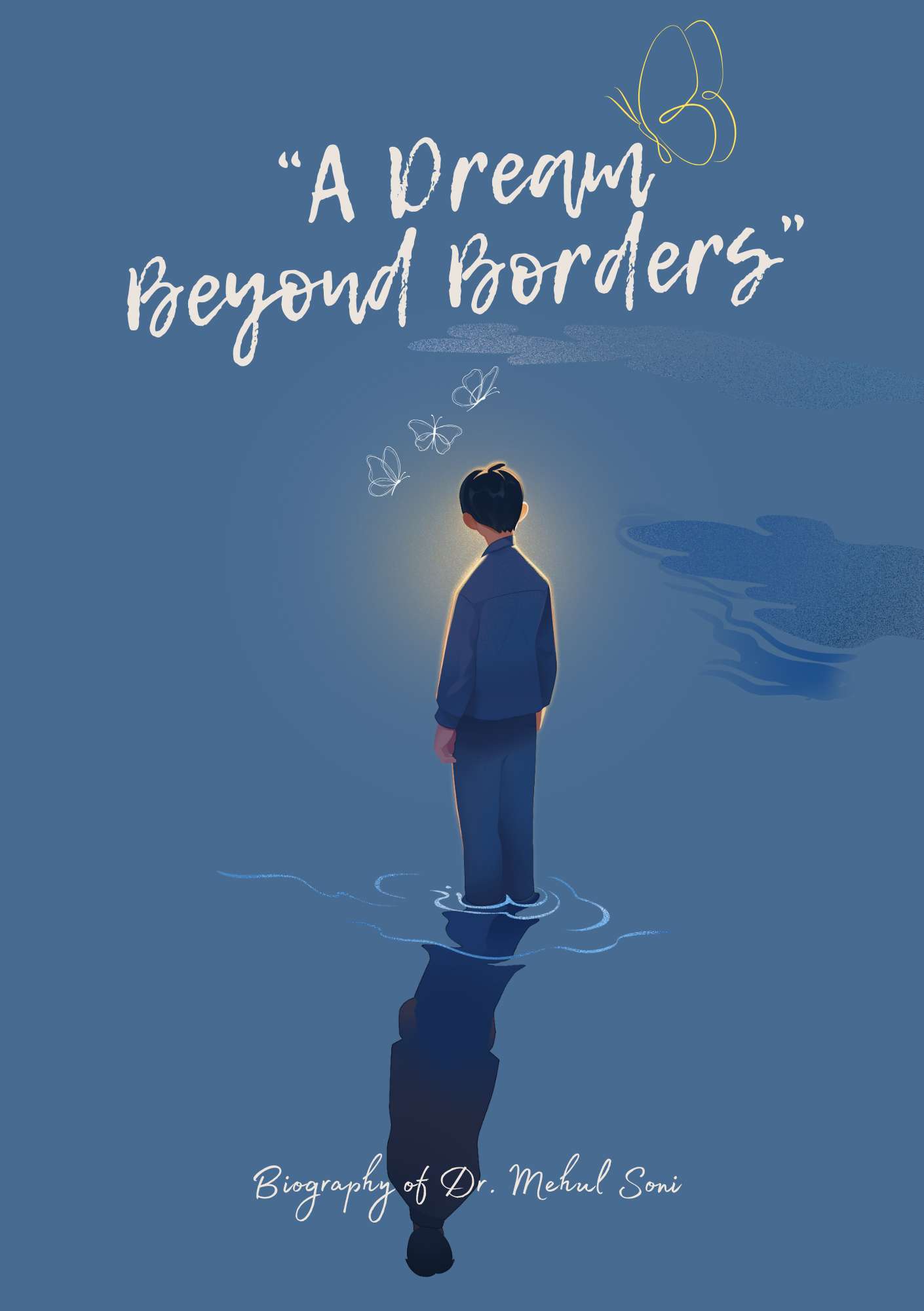

“Difficulties in life are intended to make us better, not bitter.”
Dedication
This biography is lovingly dedicated to the pillars of strength in Dr. Mehul Soni’s life—his family.
To his parents Shri Dhirubhai and Smt. Jayalaxmi Soni, whose unwavering sacrifices, wisdom, and guidance shaped the foundation of his journey. Their love and encouragement were the silent forces behind his every achievement. To his sister Nirali Soni, who supported him in his difficult times. Her patience, courage and sacrifice helped him to support stay oversees and took care of aging parents.
To his wife, Vaishali, who stood beside him through every challenge and triumph, offering unwavering support, love, and belief in his dreams. Her strength and patience made all the difference in his life’s path.
To his children, Nihar and Sanjiti, the greatest sources of joy and motivation. Their love and innocence kept him grounded and reminded him of the true purpose of his hard work and perseverance. To all his loved ones, whose faith in him never wavered, who stood by him through hardships and triumphs, and whose love was the greatest gift of all—this book is a tribute to you.
Your love, sacrifices, and unwavering belief in Dr. Mehul Soni are the true foundation of his legacy.
Phase 1 : A Humble Beginning
“Success is not final, failure is not fatal: it is the courage to continue that counts.” – Winston Churchill
Ahmedabad, a city rich in history and culture, was home to the Soni family—known not for wealth or influence, but for their deep commitment to education. In a modest yet warm household, where books lined the shelves and discussions about learning were part of daily conversations, Dr. Mehul Soni was born. His parents, both dedicated schoolteachers, believed that knowledge was the greatest legacy one could pass on. They were not just educators by profession but by passion, instilling in their son the belief that education was the foundation of a meaningful life.
From a young age, Dr. Mehul exhibited an innate curiosity. He wasn’t just a student who memorized textbooks—he was the child who asked ‘why’ and ‘how’ about everything he learned. His inquisitive nature often led him to challenge conventional thinking, sometimes even questioning the explanations given by his teachers. His parents noticed this spark in him and nurtured it, always encouraging him to go beyond the curriculum.
Dr. Mehul’s early school years were marked by promise. He was not just an above-average student; he was a boy who had a hunger for knowledge. His favourite subjects were science and mathematics, where logical reasoning and problem-solving fascinated him. However, despite his enthusiasm for learning, he was not immune to the pressures that every student faces—the pressure to score well, to meet expectations, and to pave a smooth path for his future.
By the time he reached the 10th standard, Dr. Mehul had set high standards for himself. He aimed to excel, not just to make his parents proud, but also to prove to himself that he was capable of great things. The final board exams arrived, and he put in hours of preparation, revising formulas, solving equations, and immersing himself in the vast ocean of knowledge he wished to master.
Determined to make a strong comeback, Dr. Mehul entered the 12th standard with renewed vigour. He set his sights on improvement, particularly in physics and mathematics—two subjects that he found challenging but essential for his aspirations. He spent sleepless nights working through problems, seeking guidance from his teachers, and pushing himself harder than ever before.
Thus began his journey of redemption—one where failure was not the final destination but the beginning of something greater.
Phase 2 : Rising from Setbacks
“Do not judge me by my success, judge me by how many times I fell down and got back up again.” – Nelson Mandela
Failure is often seen as an endpoint, a sign to abandon one’s dreams. But for Dr. Mehul Soni, failure became the catalyst for resilience, self-discovery, and ultimately, success. After the crushing disappointment of failing in physics and mathematics in his 12th standard, Dr. Mehul found himself at a crossroads. He could have succumbed to self-doubt and taken an easier path, but instead, he chose to fight back. The journey ahead was uncertain, the road filled with obstacles, but deep inside, he carried a fire that refused to be extinguished.
Determined to rebuild his academic standing, Dr. Mehul explored different fields where his interest in science could still thrive. It was during this introspection that he found his calling in Microbiology—a subject that fascinated him with its intricate study of microorganisms, diseases, and their impact on human life.
He enrolled in a Bachelor’s degree in Microbiology, diving headfirst into the subject. Unlike the rigid structure of school education, college offered him the opportunity to think critically, ask questions, and truly engage with the subject matter. Here, he was not just a student but a seeker of knowledge.
In his second year of college, an opportunity presented itself—one that would become a defining moment in his life. He secured a paid internship at a pharmaceutical company in Ahmedabad.
For most students, an internship was merely a requirement, a box to be checked. But for Dr. Mehul, it was much more—it was his first step into the professional world, his first taste of independence. The internship, running from 1995 to 1996, allowed him to gain hands-on experience in the pharmaceutical industry. He worked diligently, absorbing every detail, from laboratory techniques to quality control procedures.
In 1996, shortly after completing his internship, Dr. Mehul landed his first full-time job at Krishna Keshav Laboratories—one of India’s pioneering pharmaceutical firms in Parenteral Large Volume dosage forms. The salary? A mere ₹800 per month.
Between 1995 and 2003, Dr. Mehul worked at three different pharmaceutical companies, each move bringing him closer to his goal of making a mark in microbiology.
With each job, his experience deepened, his responsibilities increased, and his skills sharpened. He went from a novice intern to a skilled microbiologist, mastering laboratory techniques, understanding pharmaceutical regulations, and learning how the industry functioned.
Each transition was a step forward—a move not just for a better salary but for better learning opportunities. He was building something far greater than a career—he was building a legacy of perseverance.
Phase 3 : Family and Responsibility
The greatest gift a father can give his children is to love their mother.” – John Wooden
Life is often defined by the relationships we build and the responsibilities we shoulder. For Dr. Mehul Soni, his journey took a transformative turn when he embraced both the role of a husband and father, the responsibilities of family becoming integral to his story.
In 2002, Dr. Mehul found love in Vaishali, a woman who would not only become his wife but also his pillar of strength. Their bond was one of mutual respect, understanding, and shared dreams. Vaishali, with her quiet strength, balanced Dr. Mehul’s ambitious nature, grounding him during turbulent times and encouraging him to dream bigger.
Their union marked a fresh chapter in his life, one that was filled with hope and new responsibilities. Dr. Mehul knew that with marriage came the duty of providing for and protecting his family, and he was ready to rise to the occasion.
In 2003, the couple was blessed with their first child, a son named Nihar. The birth of Nihar was a life-altering moment for Dr. Mehul. Holding his son in his arms, he felt an overwhelming sense of responsibility and a new purpose that transcended everything he had ever known. It was no longer just about him—it was about his family’s future. Fatherhood brought with it new challenges. Dr. Mehul understood that his ambitions could no longer be just about professional success. He had to think about providing stability, education, and a secure environment for his son. This shift in focus also brought a sense of urgency to his efforts, pushing him to work harder, smarter, and more efficiently.
In the years following Nihar’s birth, Dr. Mehul’s father found himself in the midst of a dire financial crisis. Despite being a man of principle, who had worked tirelessly to provide for his family, he found himself burdened with debts that seemed insurmountable. The ancestral property, a piece of land that had been passed down for generations, was the family’s only asset that could help alleviate the mounting financial pressure.
Dr. Mehul’s heart ached at the thought of his father’s sacrifice. It was not just a financial burden that his father had borne, but an emotional sacrifice, one that involved the loss of family history and generational pride. Yet, his father’s plea was clear—Dr. Mehul needed to move forward and create a better future, a future that was free from the financial constraints that had held him back.